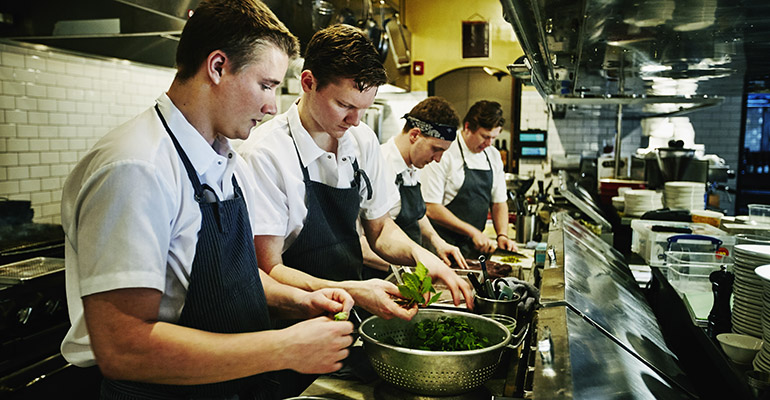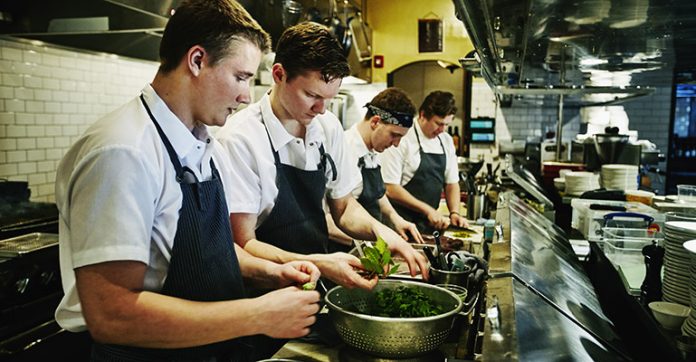
Employee retention has never been more important. We all understand that hiring is rather difficult right now, with more workers leaving our industry than entering into it. As opposed to writing an article on recruiting techniques, I wanted to write about keeping the ones you already have and why that is so important.
Here are a few benefits of hanging on to good employees.
Consistency. Delivering a consistent product is not easy. When I speak of “product,” I am not only referring to your food, but also your service, your atmosphere, your cleanliness, etc. These should all be considered part of your product. When you have tenured employees working for you, they tend to interact with your customers in a certain way; that is now your “type” or “level” of service. When you have the same cooks in the kitchen for years at a time, each guest they have cooked for has been able to enjoy a relatively similar meal, and that becomes your food quality and consistency. Though training, recipes and other working tools may be present, ultimately it is the employee who interacts with the guest and delivers their interpretation of what you have trained them.
Now more than ever, people are craving consistency. The longer you hold on to your employees, the more consistent their delivery of your product becomes. Let’s face it, when any of us are new at something, it is awkward and uncomfortable. Our guests see this. Think of why you patronize your favorite restaurant. You know that place you love to go where they are so friendly, where you don’t even say your order because they already know it, then it’s delivered in a consistent fashion so you always know what you are going to get? Well that right there, my friend, is the very essence of consistency, and it was probably delivered to you by the same employees each time. For concepts looking to franchise, go public or expand in any way, consistency is not negotiable.
Financials. The financial implications of employee retention are deep and tough to calculate. Yes, you can put a dollar amount on hiring and training a new employee; that’s easy. What is difficult to understand is that when you have well-seasoned folks working for you, it allows you a bit of creativity in your staffing. An example I will give is of a cook who used to work for me named Albert. Albert knew every station in the kitchen, and knew them well. I usually needed a Pantry Cook as well as a Sushi Cook, one in each station. This was a while ago, so let’s say I was paying $15 an hour for easy math (I really don’t remember). I came up with the idea to put him alone on both stations on slower nights. I incentivized him with a win-win proposal; work both stations and I will give you a $5 an hour raise. It saved the company money, made the employee more money and operationally we didn’t skip a beat. This simply could not have been achieved with a new cook.
Well-trained folks that have been doing something for a long period of time have developed systems, muscle memory, etc. that allow them to complete assigned tasks more quickly than one who is new to them. With labor costs being one of the largest controllable expenses in a restaurant, it is important that you identify, develop and reward the folks who bring these efficiencies to the table. Seasoned employees usually make fewer mistakes as well; cooks burn less food, servers have less ring errors, etc. I have seen the direct effect a new vs. seasoned crew can and will have on your bottom line. Long-time employees deliver consistent financial results; this allows for ease of budget writing. Hitting your budget consistently demonstrates not only that the numbers for your model make sense, but also that they can be achieved. Any investor will be looking for this before they give you a dime.
Morale. Another substantial benefit of having good retention is high morale. I’ve worked in a few “meat grinders” in my day, and all I can say is that it sucked. I think we all can name a job or boss we have had that we did not enjoy. It’s probably even safe to say that when we are at our happiest is when we are most likely to do a good job. This is no different for the folks working for us. When employees are happy, they show it. It shows not only with their interactions with guests, but also by speaking highly of the company outside of work, by having no problem helping to cover a shift and by telling their friends to come apply.
Just as an establishment with high morale is not hard to spot, the opposite is also true. To me there is really nothing worse than spending money on a service when you know that person could care less. Your guests pick up on that and will remember it next time they are deciding where to go eat. A perfect example is my grocery shopping: I personally drive an extra few minutes and miles out of my way to shop at a certain grocery store simply because of the horrible service I receive at a closer one. That company lost my business due to their service; their service was crappy due to poor morale. Bad morale costs you money. It’s as simple as that.
The bigger picture. The topics covered thus far will affect you at the unit level, but let’s think bigger than that. Let’s look at expansion, going public and growing your company. You will not be able to achieve any of these without a loyal team. Having long-term employees means that you have a bench of supervisors to make into managers, managers to make into general managers, general managers to make regional managers and so forth. It means that you have the ability to send a few of these folks out as trainers for new store openings. If you are unable to deliver a consistent product in one location, you will probably not be able to do it in two or three, right?
Tenured employees will not only deliver goods in a consistent manner, but also your policies and procedures. These folks have been with you long enough to know how to deal with any number of topics such as refunds, complaints, recipe adherence, standards, etc., and how to deal with them properly each time. Your guests notice this and will spend their money accordingly. On the employee side of this is your team knowing that they will be managed fairly and consistently.
So how do you hang onto your employees? There are many ways to ensure your team stay with you. Understand, though, that what may work in one organization can be a disaster in another. Below is a short list of a few employee incentives that I’ve seen work:
- Rereferral bonus
- Yearly awards/recognition
- Discounts on retail products
- Free or discounted meals
- Health benefits
- Employee of the month
- Teambuilding field trips
- Safety reward program
- Paid time off
- Paid sick time
- Tuition reimbursement
- Charitable donation matching
- 401k matching
- Schedule flexibility
AUTHOR BIO
Chef Matthew Tobin started his career in the front of the house in fine-dining establishments such as The White House and Orange Hill as a young Dining Room Captain, Maître Dei, etc. Shortly after, he left those more lucrative positions to pursue his passion for cooking. He has worked for companies such as Pei Wei Asian Diner, Amy’s Kitchen, Fox Restaurant Concepts, King’s Seafood Company and Specialty Restaurant Group in capacities from Corporate Chef to General Manager. He’s helped conceptualize, design, open and operate many different restaurants nationwide over his multi-decade career. Tobin is a native of California and has recently settled in Arizona with his wife Monica.











